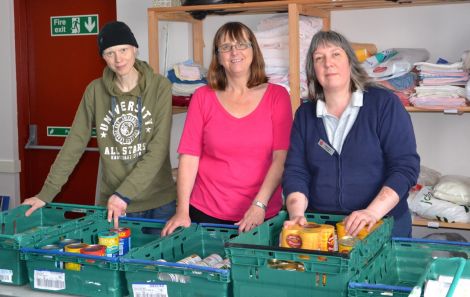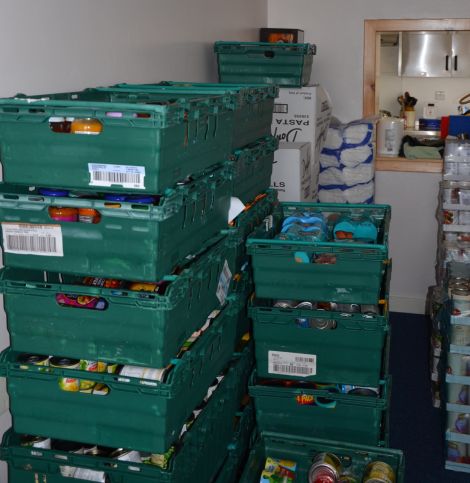News / Budget: vulnerable islanders facing ‘desperation’
WELFARE cuts announced in last week’s UK Government budget are likely to push some islanders into a state of “desperation”, according to those working to help the most vulnerable in Shetland society.
Angela Nunn of the Salvation Army in Lerwick and the town’s Citizens Advice Bureau manager Karen Eunson both have grave concerns about measures which the respected Institute for Fiscal Studies (IFS) says will leave millions of people £1,000 a year worse off.
Their fears were echoed by Northern Isles MP Alistair Carmichael, who slammed chancellor George Osborne’s budget as an “assault on the young and poor”.
While many have hailed an increase in the national minimum wage from £7.20 to £9 an hour by 2020, the IFS and many anti-poverty organisations have pointed out that £12 billion of welfare cuts will more than override the benefits.
Living wage campaigners say the rate would already need to be much higher to account for cuts to working tax credits. Factoring in the higher cost of living in Shetland, an actual living wage could conceivably be £13 or £14 an hour or more.
Nunn said she suspected that by 2020 a wage of £9 an hour will fall far short of a “living wage”, while those under the age of 25 won’t benefit at all.
“It’s completely unfair,” she said. “If you’re doing the same job you should get the same pay. I’ve never seen anywhere offer a discount to under 25s – I don’t see the logic that it’s cheaper for younger folk to live and feed themselves.
“Just looking at headline snippets – £18 billion a year cuts to public services, inheritance tax threshold has hit £1 million, house prices have hit a record £200,000 and there’s a two per cent cut in corporation tax – it’s very much a budget for the well off.”
Become a member of Shetland News
While Shetland’s booming economy ensures one of the country’s lowest unemployment rates, the cost of living is much higher and low pay remains a real problem.
She said a four-year freeze to working-age benefits from 2016 onwards “worries me hugely”.
“In the last eight years we’ve seen rises in things like food and electricity of about 45 per cent, and benefits have never caught up with the cost of those essentials.
“Benefits aren’t enough now, especially with the cost of living we have here, and I think that’s just going to push people into desperation. If anything it’s going to increase our workload in picking up the pieces.”
Eunson has a similar take, saying it is simply not possible to cut £12 billion from the welfare budget “without impacting on the amount of money that poorer folk have in their pockets”.
“Every time it always seems to be children, disabled people, the poorest folk – and with this budget the under 25s [bearing the brunt of cuts],” she said.
“One of the biggies is working age benefits being frozen for four years. That’s a huge cut for folk. The increase in the minimum wage levels is very welcome, but not enough to offset the impact of the cuts to tax credits.”
While pensions – accounting for around half of UK welfare spending – remain untouched, Eunson is especially worried about the budget’s impact on under 25s.
A disproportionate number of young people earn the minimum wage, while those under the age of 21 will no longer qualify for housing benefit which “could impact on the most vulnerable folk who don’t have parental support, if they’re living independently”.
Eunson said: “The issue is the level of this new minimum wage or ‘living wage’ – all of the research in the Highlands and Islands is showing that we need 10-40 per cent more than you would in urban areas, so it’s kind of a moot point here anyway.”
She also criticised Chancellor George Osborne’s change to child tax credits, which will only apply to the first two children from April 2017 onwards. “Does the third child eat less?” Eunson asked. “It definitely impacts on children in poorer families.”
For the first six months of 2015, Nunn says, the average number of Salvation Army food parcels dished out in Shetland has been 33 – compared to 23 last year.
The service received a major boost with customers at Tesco’s Lerwick supermarket donating 192 green boxes in just three days last week, while there was also a huge donation from local shop Don Leslie’s which dropped off a transit van full of foodstuffs.
Nunn praised Tesco staff for running a “very high profile, prominent stall” at the shop and giving out leaflets encouraging customers to donate.
“It’s come at a good time because we’ve already had our biggest year so far by quite a way,” she added.
“Customers have been asking for a permanent donation point. We are still fighting that battle [where] people think Shetland’s a wealthy place, there’s nobody here that’s in need, and sadly it’s not true at all.
“It’s about seeing people as people. Everybody is valued, precious, unique; not just a figure on the balance sheet, which is very much how it came across in the budget.
“Behind each number there’s a human, a family, scenario going on, and politicians seem to lose track of that sometimes.”
Carmichael, who worked with the Tories in coalition for five years, said the first Conservative-only budget in 20 years was “blue in tooth and claw” and showed that “the nasty party is well and truly back”.
“Liberal Democrats in government forced the Conservatives to ensure that we balanced the books fairly, protecting spending in key areas while getting the economy back on track,” he said. “Now we are seeing the true face of the Tory party and it is not a pretty sight.”
He continued: “Tory reforms on ESA [employment support allowance] mean that new claimants with conditions like depression, schizophrenia and bipolar disorder will face a future with £30 a week less than people do at the moment, a third of their weekly support.
“Tory reforms to tax credits could affect half of all families in Scotland who receive these payments in Scotland at present.”
Carmichael said the £9 a week living wage was “lower than the living wage in Scotland at present” and “many of those who will qualify for a pay raise will also be losing their tax credits”.
He said the latest increase to the income tax threshold was a continuation of a policy the Liberal Democrats forced the Tories to introduce in the 2010-2015 coalition government.
“What we have seen,” Carmichael added, “is a Tory budget that will make life tougher for thousands of public sector workers, families and young people across the UK.
“I was also disappointed to hear no specific measures to support the oil and gas industry and I will continue to press ministers on this.”
Become a member of Shetland News
Shetland News is asking its many readers to consider paying for membership to get additional features and services: -
- Remove non-local ads;
- Bookmark posts to read later;
- Exclusive curated weekly newsletter;
- Hide membership messages;
- Comments open for discussion.
If you appreciate what we do and feel strongly about impartial local journalism, then please become a member of Shetland News by either making a single payment, or setting up a monthly, quarterly or yearly subscription.































































